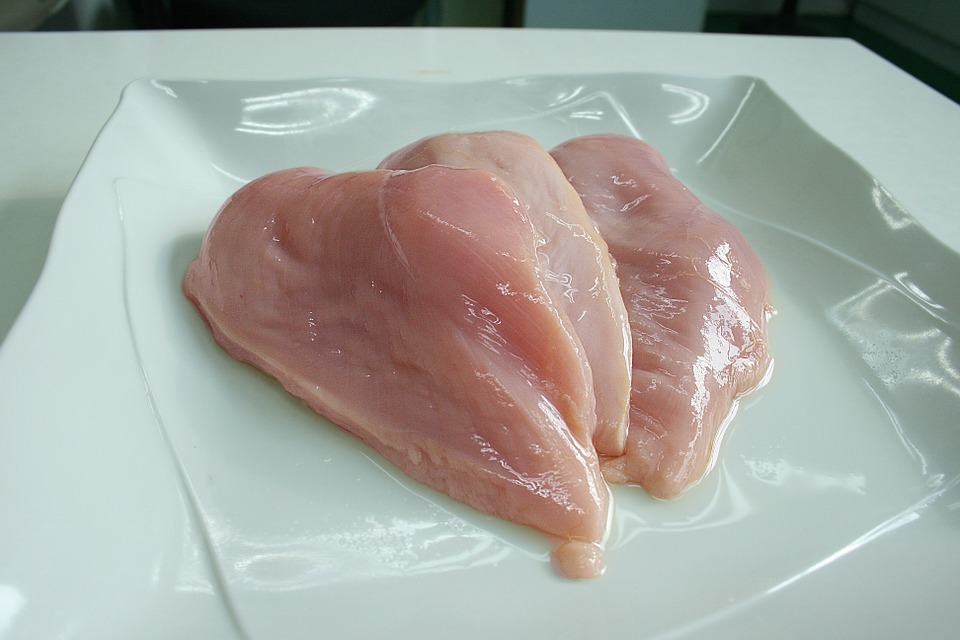(Português) Coronavírus Pode Sobreviver na Carne por Três Semanas
ORIGINAL LANGUAGES, 21 Sep 2020
David Arioch | Vegazeta – TRANSCEND Media Service
Pesquisadores da Irlanda e de Singapura perceberam grande resistência do vírus na carne de frango, de porco e no salmão.

“Nosso trabalho de laboratório mostrou que o SARS-CoV-2 pode sobreviver ao tempo e às temperaturas associadas às condições de transporte e armazenamento” . (Foto: Pixabay)
17 set 2020 – De acordo com um estudo concluído em agosto e publicado por pesquisadores de Singapura e da Irlanda na plataforma de conteúdo científico bioRxiv, o coronavírus (SARS-CoV-2) pode sobreviver em alimentos de origem animal como carne de porco, frango e salmão por três semanas.
“Nosso trabalho de laboratório mostrou que o SARS-CoV-2 pode sobreviver ao tempo e às temperaturas associadas às condições de transporte e armazenamento associados ao comércio internacional de alimentos. Ao adicionar SARS-CoV-2 a pedaços de frango, salmão e porco, não houve diminuição do vírus infeccioso após 21 dias a 4°C (refrigeração padrão) e –20°C (congelamento padrão)”, informa o artigo no artigo “Seeding of outbreaks of COVID-19 by contaminated fresh and frozen food”.
Os pesquisadores apontam que é possível que parte da contaminação de trabalhadores em frigoríficos tenha relação com carne contaminada. “O mercado internacional de alimentos é enorme e até mesmo um evento muito improvável pode ocorrer de tempos em tempos.”
Também acrescentam: “Nossas descobertas, juntamente com os relatórios da China sobre SARS-CoV-2 detectado em frango congelado importado, assim como em camarão congelado, devem alertar as autoridades competentes em segurança alimentar e a indústria de alimentos sobre um ‘novo ambiente normal’, onde esse vírus está representando um risco de segurança alimentar não tradicional.”
_____________________________________________
David Arioch é jornalista profissional, historiador e especialista em jornalismo cultural, histórico e literário.
Go to Original – vegazeta.com.br
Tags: Animals, COVID-19, Coronavirus, Meat Industry, Pandemic, Science and Medicine
DISCLAIMER: The statements, views and opinions expressed in pieces republished here are solely those of the authors and do not necessarily represent those of TMS. In accordance with title 17 U.S.C. section 107, this material is distributed without profit to those who have expressed a prior interest in receiving the included information for research and educational purposes. TMS has no affiliation whatsoever with the originator of this article nor is TMS endorsed or sponsored by the originator. “GO TO ORIGINAL” links are provided as a convenience to our readers and allow for verification of authenticity. However, as originating pages are often updated by their originating host sites, the versions posted may not match the versions our readers view when clicking the “GO TO ORIGINAL” links. This site contains copyrighted material the use of which has not always been specifically authorized by the copyright owner. We are making such material available in our efforts to advance understanding of environmental, political, human rights, economic, democracy, scientific, and social justice issues, etc. We believe this constitutes a ‘fair use’ of any such copyrighted material as provided for in section 107 of the US Copyright Law. In accordance with Title 17 U.S.C. Section 107, the material on this site is distributed without profit to those who have expressed a prior interest in receiving the included information for research and educational purposes. For more information go to: http://www.law.cornell.edu/uscode/17/107.shtml. If you wish to use copyrighted material from this site for purposes of your own that go beyond ‘fair use’, you must obtain permission from the copyright owner.
Read more
Click here to go to the current weekly digest or pick another article:
ORIGINAL LANGUAGES:
